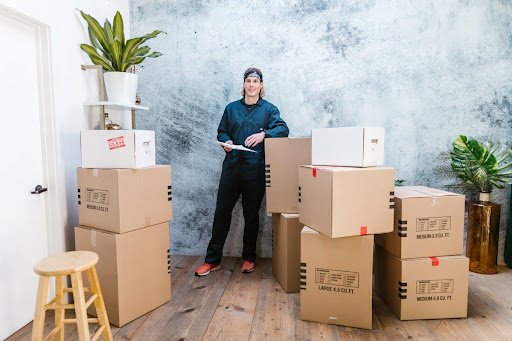How To Move Out Of State? Checklist and Tips
We partnered with a moving company. for this post. The opinions in the post are honest. All reviews and opinions expressed in this post are based on our personal views. We are excited because we know you will love it.
Moving out of state is both an exciting and demanding experience. Whether you're relocating for a new job opportunity, seeking a change of scenery, or starting fresh in a different environment — the process always requires careful planning and organization.
From packing up your belongings to navigating the logistics of a long-distance move, there are several key steps to consider. In this guide, we'll provide you with a comprehensive checklist and valuable tips to help streamline your move and ensure a smooth transition to your new home.
1. Create a Moving Budget
Moving expenses include costs for packing supplies, hiring movers, transportation, and unexpected expenses that may arise during the process. We recommend you begin the process by assessing your financial situation and determining how much you can comfortably allocate towards your move.
Start by researching typical moving costs for your specific circumstances, such as:
The distance of your move
The size of your household
Additional services you may require
Obtain quotes from multiple moving companies to compare prices and services offered. Remember to factor in additional expenses such as storage fees, travel expenses, and utility deposits for your new residence.
Once you have a clear understanding of the potential costs involved, create a detailed budget outlining each expense category and allocating funds accordingly. Be sure to account for any last-minute expenses and leave room for flexibility in case of unforeseen circumstances.
2. Pick a Suitable Moving Company
Next, the biggest task is to choose the right moving company. With countless options available, it's essential to conduct thorough research to find a reputable and reliable moving company that meets your needs.
Start by asking for recommendations from friends, family, or colleagues who have recently moved to another state. Or you can google the best state to state movers in your vicinity or area.
When evaluating moving companies, consider factors such as their experience, licensing, insurance coverage, and accreditation. It’s also a good idea to verify that the company is registered with the Federal Motor Carrier Safety Administration (FMCSA) and has a valid USDOT number, which indicates compliance with federal regulations for interstate movers.
Once you have shortlisted your best options, request quotes from multiple moving companies and compare their pricing, services, and terms of contract. If some companies give you unusually low estimates (as compared to standard rates), be sure to check for hidden fees or potentially subpar service quality.
Instead, opt for a moving company that offers transparent pricing and provides a written contract detailing all services and costs involved.
Before entrusting a company entirely with your move, schedule in-person or virtual consultations to discuss your specific moving requirements and address any questions or concerns you may have. Pay attention to the professionalism, responsiveness, and communication skills of the company representatives, as these qualities are indicative of their commitment to customer satisfaction.
3. Visit Your Destination
When you’ve settled for reputable movers, it’s best to invest time in familiarizing yourself with your new surroundings and ensure that it's the right fit for you and your family. Plan a visit to explore the area firsthand, and assess key factors such as housing, employment opportunities, schools, healthcare facilities, and recreational amenities.
If possible, schedule a small scouting expedition to your new city or town to get a sense of its culture, lifestyle, and overall vibe. Take the time to explore different neighborhoods, visit local attractions, and engage with residents to gain valuable insights into the community there.
You can also use this opportunity to connect with local real estate agents or rental agencies to explore housing options and gain a better understanding of the housing market in your desired area. If you have children, arrange to visit schools and childcare facilities.
4. Get Your Paperwork Done
Get essential paperwork sorted before moving out of state. Update your address with USPS and notify banks, utilities, and subscriptions. Obtain a new driver's license and register your vehicle with the new state's DMV. Update voter registration and legal documents like wills. Transfer medical records to new healthcare providers. Update financial accounts with the new address. If moving internationally, research and fulfill legal residency or visa requirements.
5. Begin to Pack
Start packing well in advance to avoid last-minute stress and ensure an organized move.
Begin by decluttering your belongings and sorting items into categories to determine what to keep, donate, or discard. Invest in quality packing supplies, including boxes, bubble wrap, packing tape, and markers.
Pack room by room, starting with non-essential items and seasonal belongings. Label boxes clearly with their contents and designated room to facilitate unpacking. Consider hiring professional movers for heavy or bulky items to streamline the process.
Don’t forget to meet family & friends!
Final Words
Lastly, as you prepare to move out of state — remember the importance of meeting with family and friends before leaving. These gatherings provide valuable emotional support, create cherished memories, and instill a sense of closure. Prioritize these connections amidst the hustle and bustle of relocation for a smoother transition!


